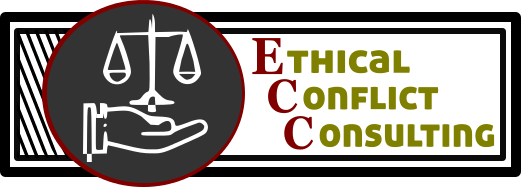The following piece comes from a course by William A. “Trey” Brant, PhD. and William A. “Bill” Brant, JD, PE titled Professional Ethics: To Whistleblow or not to Whistleblow. The following excerpt offers you a method for moral guidance on how to whistleblow ethically.
A Whistleblowing Process for Professionals with Ethical Scientific Methodology
Here is how someone might go about whistleblowing:
(1) Record the observed instances of unprofessional communications, unsafe, inefficient or unfair work practices via their times, dates, locations, and names. Some whistleblowers have spent considerable time as employees at their workplaces, gathering evidence before they inform others of covert actions.
(2) Record the content of the unprofessional communications and the descriptions of the observed unsafe, inefficient or unfair practices to coincide with the places, times and names.
(3) Record the observed instances of hearsay, if any, of the unprofessional communications, unsafe, inefficient or unfair work practices via their content or descriptions, times, dates and locations.
(4) Store the information in a safe place to prevent anyone else from accessing your records. Your computer at work might not be a safe place since others may view your information as administrators. They can confiscate your computer.
(5) Analyze the organizational chart, the chain of command, the procedures for filing of grievances and the expected consequences for retaliation against filing grievances, and plan ahead.
(6) Study the consequences of whistleblowers in your industry, history of your organization and turnover rates of employees.
(7) Analyze the possibility, or request a whistleblowing system be established before filing the major complaint inside the organization. If you work for a large organization, consider cronies who work in the organization. They may span from department to department.
(8) Gain knowledge of the statistics for the economic sector, industry, and type of workplace where you work.
(9) Before any decision to whistleblow, consider how much time, effort and money must be invested in the act. Consider what the consequences at the workplace would be for everyone involved, such as clients, customers, owners, employees and even the business competitors.
(10) Use the following methods of professional ethics: Seven Levels of Analysis of Professionals: Ask yourself whether your organization and the practices at your organization benefit: (1) you as the individual; (2) your family; (3) your community where you live; (4) the city; (5) the state or province; (6) the country; and (7) the world.
A Social, Technological, Economic, Environmental, Political, Legal Ethical Demographic and International Comparative analysis (STEEPLEDIC analysis) of the organization is necessary. If your organization falls short of benefiting any of (1) through (7) or falls short of something that is made apparent from a STEEPLEDIC analysis of it, there is an ethical demand to improve it, to make another move or to report the relevant problems.
(11) Remember the Hippocratic Oath with its first principle that if you do not know what to do, then do no harm.
